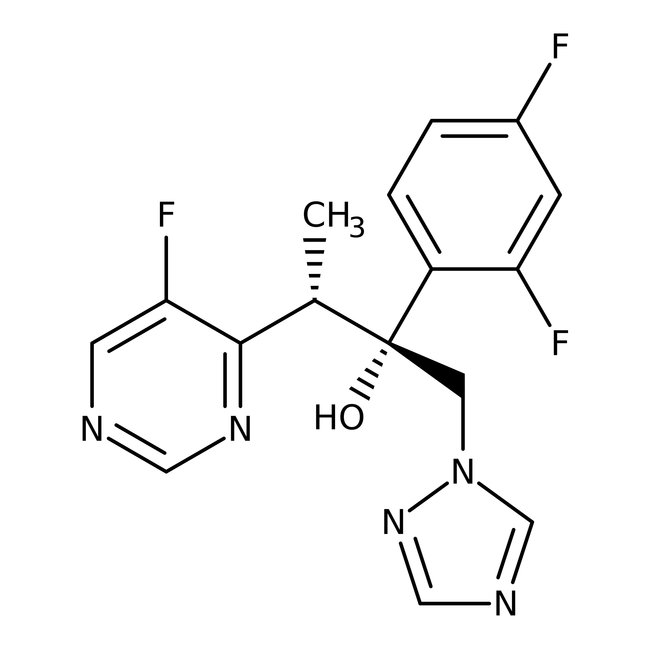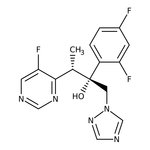Search Thermo Fisher Scientific
Voriconazole, 98%, Thermo Scientific Chemicals
Voriconazole, CAS # 137234-62-9, is an antifungalagent that acts by inhibition of sterol biosynthesis.
| Catalog Number | Quantity |
|---|---|
| FSA458670010 | 1 g |
Catalog number FSA458670010
Quantity:
1 g
Specifications
Chemical Name or MaterialVoriconazole
TypeVoriconazole
CAS137234-62-9
Health Hazard 1Danger
Health Hazard 2GHS H Statement Toxic if swallowed. Suspected of causing cancer. May damage fertility or the unborn child. May cause damage to organs through prolonged or repeated exposure. Harmful to aquatic life with long lasting effects.
View more
This Thermo Scientific Chemicals brand product was originally part of the Acros Organics product portfolio. Some documentation and label information may refer to the legacy brand. The original Acros Organics product / item code or SKU reference has not changed as a part of the brand transition to Thermo Scientific Chemicals.
General Description
- Voriconazole is an antifungal compound that has activity against a wide variety of fungal species including Aspergillus and Candida
- Voriconazole blocks sterol biosynthesis in Candida species through inhibition of CYP450-dependent 14-alpha sterol demethylase
- It depletes the presence of ergosterol in the fungal cell membrane, which can lead to death or growth inhibition, depending on the organism
Applications
- Voriconazole may be used in laboratory studies of drug safety, pharmacokinetics, and mechanism of action
RUO – Research Use Only
General References:
- Kappe, R. Antifungal activity of the new azole UK-109, 496 (voriconazole). Mycoses. 1999, 42, 2:83-6
- Sanati, H.; Belanger, P.; Fratti, R.; Ghannoum, M. A new triazole, voriconazole (UK-109,496), blocks sterol biosynthesis in Candida albicans and Candida krusei. Antimicrob Agents Chemother. 1997 Nov;41(11), 2492-6.
- Zhao, Y.; Hu, D.; Wang, R.; Sun, X.; Ropelewski, P.; Hubler, Z.; Lundberg, K.; Wang, Q.; Adams, D.J.; Xu, R.; Qi, X. ATAD3A oligomerization promotes neuropathology and cognitive deficits in Alzheimer's disease models. Nat Commun. 2022, 13(1), 1121.
- Ishikawa, M.; Yoshitomi, T.; Covey, D.F.; Zorumski, C.F.; Izumi, Y. Additive neuroprotective effects of 24(S)-hydroxycholesterol and allopregnanolone in an ex vivo rat glaucoma model. Sci Rep. 2018, 8(1), 12851.



